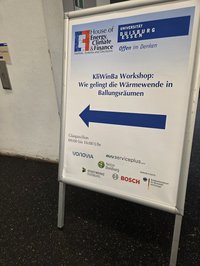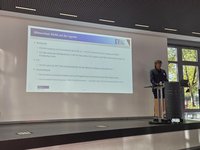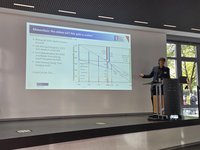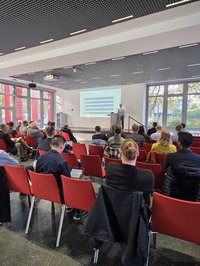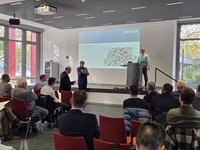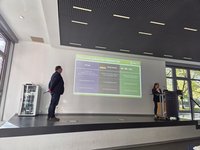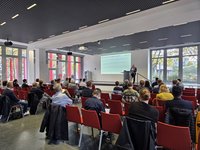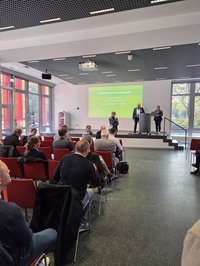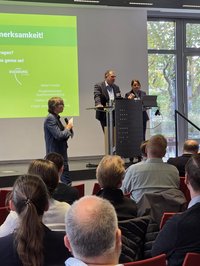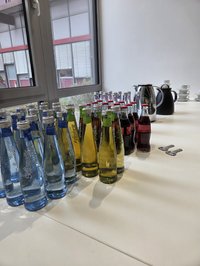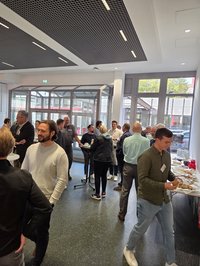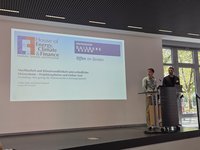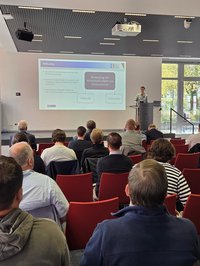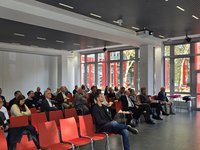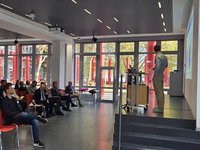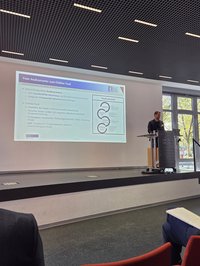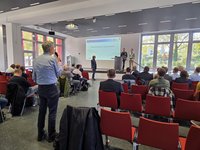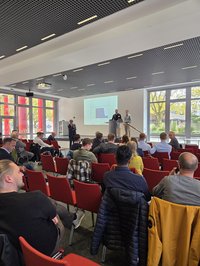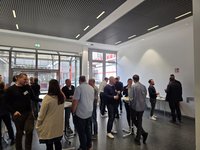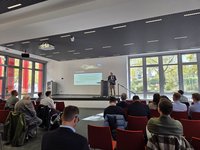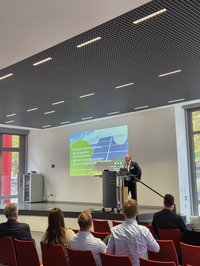Workshop: Heat transition in metropolitan areas
Workshop: How can the heating transition succeed in metropolitan areas?
Thursday, October 09, 2025 in Essen
As part of the KliWinBa project, our workshop “How can the heating transition succeed in metropolitan areas?” took place on Thursday, October 9, 2025, in the glass pavilion on the Essen campus! The aim of the workshop was to discuss the challenges and opportunities of the heating transition in urban metropolitan areas and to jointly consider solutions and strategies for a sustainable and efficient heating transition.
Around 50 stakeholders from academia and industry gathered at the University of Duisburg-Essen to take part in the workshop. Prof. Christoph Weber welcomed the participants and gave a brief insight into the current challenges on the road to climate neutrality by 2045. This was followed by presentations on strategies and measures for the heating transition in existing buildings (Dr. Pawel Naliwajko, Vonovia SE) and on municipal heating planning in Duisburg (Katja Kleegräfe and Stefan Foraita, DVV mbH). Both presentations left plenty of room for questions, leading to lively discussions between the speakers and participants.
After a slight delay, there was a short coffee break before Daniel Brunsch and Tobias Ader (UDE) presented the initial project results and the online tool developed in the project for calculating the economic efficiency of heating systems. This presentation and, above all, the tool were also well received, leading to lively discussions afterwards! The comments and questions continued into the lunch break.
In the afternoon, the program continued with two presentations on legal barriers (Prof. Dr. Christian Pielow) and current experiences with the design of GEG-compliant heat generators for existing buildings (Thorsten Coß, AVU Serviceplus GmbH). In a subsequent breakout session, the participants discussed practical, regulatory, and economic challenges. In particular, topics were addressed that had not yet been covered in the previous presentations—such as the sometimes overly complex and misguided subsidy structures, the lack of cooperation between stakeholders (e.g., in infrastructure measures, when roads are opened anyway, district heating, fiber optic or drinking water pipes could be laid or renewed at the same time) and the high electricity prices compared to other countries, which make it difficult to expand heat pumps in Germany.
Finally, workshop participants enjoyed a presentation by Lars Grothe (BDEW) on the topic of “From heat planning to financing to implementation.” Using the example of the Germany Fund for District Heating announced by KfW with a planned volume of around €10 billion (as of the end of June), he showed how funding instruments could be used in a more targeted manner in the future to facilitate investments in the heat transition. The event concluded with a summary by Prof. Dr. Christoph Weber.
We would like to thank all participants for their active involvement in our workshop! Below you will find a few impressions of the day.
Agenda
| Time | Topic | Speaker |
|---|---|---|
| 09:00 - 09:30 a.m | Registration | |
| 09:30 - 09:40 a.m | Welcoming words | Prof Dr Christoph Weber (Uni DUE) |
| 09:40 - 10:10 a.m | Strategies & measures for the heat transition in existing buildings | Dr Pawel Naliwajko (Vonovia SE) |
| 10:10 - 10:40 a.m | Heat planning in Duisburg's urban centres: Municipal approaches and perspectives | Katja Kleegräfe (Duisburger Versorgungs- und Verkehrsgesellschaft mbH) Stefan Foraita (Duisburger Versorgungs- und Verkehrsgesellschaft mbH) |
| 10:40 - 11:00 a.m | Coffee break | |
| 11:00 - 11:45 a.m | Feasibility and climate friendliness of different heating systems - project results and online tool | Daniel Brunsch (University of Duisburg-Essen) Tobias Ader (University of Duisburg-Essen) |
| 11:45 - 12:15 | Legal barriers to climate-friendly heating systems and possible solutions | Prof Dr Christian Pielow |
| 12:15 - 13:15 | Lunch break | |
| 13:15 - 13:45 | Current experiences from the design of GEG-compliant heat generators for existing buildings | Thorsten Coß (AVU Serviceplus GmbH) |
| 13:45 - 14:30 | Topic-specific break-out sessions ➢ Regulatory challenges ➢ Practical challenges ➢ Economic challenges | |
| 14:30 - 14:45 | Coffee break | |
| 14:45 - 15:15 | Presentation of the results of the break-out sessions | |
| 15:15 - 15:45 | From heat planning to financing and implementation | Lars Grothe (BDEW) |
| 15:45 - 16:00 | Conclusion of the workshop | |
Image and video recordings
By registering for the event, participants give their consent to photo and video recordings. These may be used and published for reporting purposes after the event.
Data protection
By registering, you agree that your data may be stored and processed for the preparation and organisation of the event and may be passed on to the speakers as part of a list of participants. Your data will not be passed on to third parties. If you do not agree to the storage of your data, please inform us. Further information on our data protection guidelines can be found here.

